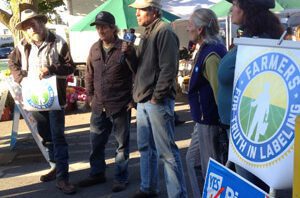Contact:
Paul Towers, Pesticide Action Network
916-216-1082, ptowers@panna.org
November 7, 2012
Pesticide Industry Heavyweights Defeat Food Labeling Initiative by Outspending the Opposition 5-to-1, Successfully Protect Marketshare for a Pipeline of New GE Crops
——-
Despite broad public support for labeling, California voters misled by multi-million dollar advertisement campaign
——-
Vote comes as USDA weighs approving first in new wave of genetically engineered seeds & pesticides made by Prop 37 opponents
Oakland, CA — After weeks of misleading television and internet advertisements, as well as deceptive mailers funded by pesticide corporations, California voters failed to pass Proposition 37, a measure that would label genetically engineered (GE) foods.
“Despite strong public support, California voters were ultimately deceived by one of the more insidious misinformation campaigns I’ve seen,” said Marcia Ishii-Eiteman, PhD, senior scientist at Pesticide Action Network. “Industry bombarded Californians with TV ads that had to be pulled and fake mailers claiming to represent the views of the Democratic Party. But despite being outspent by more than 5-to1, the good news is that millions of Californians stood up for our right to know what’s in our food and how it’s grown. This movement will only continue to grow.”
Public support for the measure, like labeling in general, has remained strong until recent weeks. Nationally, over 90% of voters have consistently supported GE labeling. After a flood of misleading television advertisements from out-of-state pesticide corporations, including several featuring a long-time DDT industry pundit, support for the measure dropped from 69.4% to 39.1% over a period of 12 weeks. Support dwindled in close correspondence with campaign contributions from the pesticide and processed food industries – topping out at $46 million.
In recent weeks, farmers and scientists have spoken out in favor of labeling. John Coelho, a grape and pistachio grower with a few thousand acres outside Fresno helped launch a network of Farmers for Truth in Labeling to address negative ads.
“Opponents of Proposition 37 don’t speak for farmers,” said Coelho. “We remain committed to transparency and honest conversations about food. Labeling genetically engineered food will only help us serve our customers.”
These farmers, like the thousands of volunteers that worked on the campaign, have generated increased attention around genetically engineered food and crops and the challenges they present for a sustainable food system. For many, the campaign underscored the commitment by a handful of pesticide corporations to retain control of the food and farming system.
Monsanto and five other out-of-state corporations — BASF, Bayer, Dow, DuPont and Syngenta, collectively known as the “Big 6” — dominate the world’s seed and pesticide markets and actively opposed the GE labeling initiative. Opposition to Proposition 37 raised more than $46 million, including $21 million from these six pesticide corporations which quickly rose to the top of the list of big corporations bankrolling the opposition.
“Pesticide corporations are trying to sell us a bill of goods,” said Marga den Hoed, with Common Kettle Farm, in the Sacramento Region. “Genetically engineered crops make farming more expensive, and keep farmers tethered to the pesticide treadmill. We have to fight to keep the food system working for farmers and consumers.”
As recent studies and U.S. Department of Agriculture data suggest, genetically engineered crops — namely corn, cotton and soy — have driven up the use of pesticides over the past 15 years by over 400 million pounds. In turn, this has led to the development of herbicide-resistent “superweeds,” which in turn drive the use of more and increasingly toxic pesticide mixes aimed at controlling these weeds.
Monsanto and Dow, two of the lead funders of the effort to oppose proposition 37, are hoping to introduce corn and soybean crops resistant to the hazardous herbicides 2,4-D and dicamba. 2,4-D and dicamba are drift-prone pesticides, known to cause damage to neighboring crops and impact the health of rural residents.
“The dirty little secret of the pesticide industry is that genetically engineered seeds drive up pesticide use by design,” said Dr. Ishii-Eiteman. “Without labeling, and the consumer awareness that comes with it, the pesticide/GE seed industry will continue to enjoy unfettered access to the U.S. market. They plan to introduce one GE crop after another in a pipeline of untested products that are not what they seem. Secretary Tom Vilsack and the U.S. Department of Agriculture have an opportunity turn off this tap and must act soon.”
###
Available for interviews: scientists, moms, and conventional and organic farmers.







